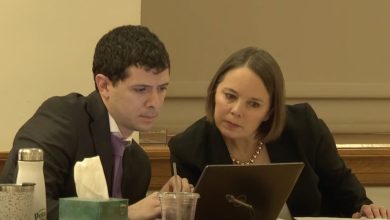Court Deals Massive Blow To Biden

On Wednesday a U.S. District Court delivered a significant setback to the Biden administration’s climate change agenda, striking down a controversial rule aimed at reducing greenhouse gas emissions from the nation’s highways.
The rule, introduced by the Department of Transportation (DOT)’s Federal Highway Administration (FHWA) in December 2023, sought to compel states to actively measure, report, and establish declining targets for carbon dioxide emissions generated by vehicles on U.S. highways.
The state of Texas, challenging the federal mandate, argued that the FHWA had overstepped its authority with the imposition of the new rule. U.S. District Judge James Wesley Hendrix, appointed by former President Trump, concurred with Texas, stating unequivocally that “the rule was unauthorized.”
“A federal administrative agency cannot act without congressional authorization,” Hendrix wrote. The contested rule required states not only to track and report greenhouse gas emissions but also to set and strive for progressively lower emission targets. The Biden administration defended the rule as a crucial step towards mitigating climate change and promoting sustainable transportation infrastructure.
However, Texas presented a strong legal challenge, asserting that the FHWA lacked the statutory authority to enforce such environmental mandates under the current legislative framework. Judge Hendrix’s analysis aligned with this perspective, saying that the DOT’s expansive interpretation of its regulatory powers was unsupported by the statute’s text.
“The relevant definitions and related performance measures make clear that ‘performance of the Interstate/National Highway Systems’ focuses on the infrastructure’s effectiveness in facilitating travel, commerce, and national defense—not environmental outputs of vehicles using the systems,” Hendrix elaborated.
In December, Transportation Secretary Pete Buttigieg stated that the “new performance measure will provide states with a clear and consistent framework to track carbon pollution and the flexibility to set their own climate targets.”
Texas Attorney General Ken Paxton vehemently opposed the initiative, declaring the state’s intention to halt “unlawful climate mandates.” Additionally, in December, a coalition of 21 states filed a lawsuit in Kentucky to contest the regulation, a case that remains unresolved.
Texas argued that the new Department of Transportation (DOT) regulation surpasses the authority granted by Congress to the administration according to CW39. Furthermore, the state contended that reaching net zero emissions by 2050 is an “ultimately impossible to achieve” goal. Additionally, Texas maintained that the various state DOTs lack any experience in environmental regulation.
“For Texas, to achieve declining targets year over year would require substantial changes to how the citizens of Texas use the Interstate and National Highway System and would drastically impact the economy because Texas has major national and international ports and distribution centers,” the lawsuit stated.
“Moreover, the DOT’s expansive interpretation is undermined by the fact that adopting it would render other statutory provisions superfluous,” added Judge Hendrix, further critiquing the DOT’s rationale for the rule.
The decision is a significant blow to the Biden administration’s broader climate policy ambitions, signaling judicial resistance to expansive interpretations of regulatory authority without clear legislative backing. The ruling not only halts the implementation of the greenhouse gas reporting rule but also raises concerns about the scope of federal agencies’ power to enact climate-related regulations.


